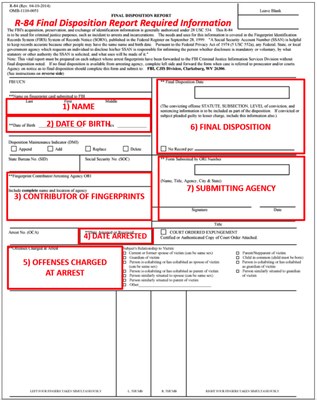Arrest Disposition Submission
Arrest Disposition Submission
Section I. Introduction
An Identity History Summary—often referred to as a criminal history record—includes an individual’s identifiers (descriptive information and fingerprints), arrests, and subsequent dispositions. All information on an Identity History Summary is obtained from fingerprint submissions, disposition submissions, and other information submitted by authorized criminal justice agencies to the FBI’s Criminal Justice Information Services (CJIS) Division. Each criminal arrest should have a disposition.
The FBI defines a disposition as the formal or informal conclusion of an arrest or charge at whatever stage it occurs in the criminal justice system. A disposition reports the court’s findings and can include information as to whether an arrest charge has been modified or dropped.
Dispositions are submitted by criminal justice agencies and posted to the Identity History Summary to ensure accuracy and completeness. Dispositions are submitted to the CJIS Division by:
- State Criminal History Repositories
- Arresting Agencies (Sheriff’s Offices, Police Departments, State Police, Correctional Facilities)
- Courts
- Federal Agencies (FBI, Drug Enforcement Administration, Bureau of Alcohol, Tobacco and Firearms, U.S. Marshals, Immigration and Customs Enforcement, etc.)
Note: If you have reached this page because you are seeking information on how to obtain your Identity History Summary or challenge the presence or absence of information on your summary, review the Challenge of an Identity History Summary to obtain information regarding your FBI Identity History Summary or contact us at 304-625-5590.
Importance of Arrest Dispositions
In every instance where criminal arrest fingerprints have previously been submitted to the FBI, it is imperative that the final disposition be submitted to maintain a complete and accurate Identity History Summary.
A complete Identity History Summary is important to Law Enforcement for investigative purposes, as well as for non-criminal justice background checks for employment, licensing, adoption, citizenship and firearm purchases. In any of these cases, if a disposition is not present on the individual’s Identity History Summary, this could prevent or delay finalization of these proceedings.
Section II. Arrest Disposition Submission Formats
Dispositions can be submitted via compact disk-read only memory (CD-ROM) Machine Readable Data (MRD), electronic format via the Interstate Identification Index (III) Disposition Message Key, or paper format (Disposition Forms).
Over half of all dispositions received by the CJIS Division are submitted via MRD. States submitting dispositions via MRD prepare the disposition information per specified guidelines established in the Disposition/Expungement MRD Specifications Manual. Each CD contains up to 20,000 dispositions. There is no waiting period for a disposition to be posted once the CJIS Division receives the MRD CD. The CDs are processed and information is automatically updated to Identity History Summaries with minimal manual intervention. This means in a matter of hours, several thousand summaries will have updated disposition information. MRD submission results in major savings in personnel resources and faster processing.
MRD Requirements
Currently, only state agencies can submit dispositions via MRD. In order to submit dispositions via MRD, the state must meet the following requirements:
- Must be a Single Source State: This means that the State Criminal History Repository is the centralized agency for dispositions, expungement requests, corrections, deceased notices and consolidations.
- State Criminal History Repository must be the Point of Origin for MRD submission.
- Media Type: CD-ROM.
For more information, contact the FBI at 304-625-3652 or via e-mail at fbi-iii@leo.gov and ask for the Disposition/Expungement MRD Specification Manual.
III Disposition Message Key Requirements
Currently, only state agencies can submit dispositions via III. In order to submit dispositions via III, the state must meet the following requirements:
- Must be an III participating state.
- Must be programmed to receive automated accept and reject messages.
- Must successfully test with the FBI CJIS Division prior to submitting.
For more information, contact the FBI at 304-625-3652, or via e-mail at fbi-iii@leo.gov.
Paper Disposition Forms
Some examples of paper Disposition Forms include:
- Court Orders
- Computerized Forms Devised and Approved by the Respective State
- R-84 Final Disposition Report
The R-84 Final Disposition Report is the most commonly used paper Disposition Form. The R-84 is a standard form available through the FBI, free of charge. To order R-84 Final Disposition Reports or R-84 Training Forms, contact the FBI at 304-625-3983.
 Required Information for the R-84 Final Disposition Report
Required Information for the R-84 Final Disposition Report
1) Name
The name submitted on the original arrest fingerprints that established the record. The format is last name followed by a comma, first and middle name, if any. Suffixes denoting seniority (e.g., Jr., Sr., III, etc.) should follow the middle name.
2) Date of Birth (DOB)
DOB in month, day and year format (e.g. MM/DD/YYYY). If a complete DOB is not known, enter the approximate age of the subject followed by the statement, “Years of Age.”
3) Contributor of Fingerprints
The name and location of the agency that submitted the original arrest fingerprints.
4) Date Arrested or Received
Date the subject was arrested by the contributor of the original arrest fingerprints. The format is month, day and year (e.g., MM/DD/YYYY).
5) Offenses Charged at Arrest
Express the original arrest charge(s) in literal terms (e.g., murder, rape, robbery, etc.). Numeric arrest codes and U.S. Title Codes are acceptable when accompanied by the literal charge.
6) Final Disposition
- List all final disposition information, including the sentence date for each charge.
- Include amended charges.
- Indicate the type of sentence imposed if applicable (e.g., consecutive, concurrent, probation, etc.).
- Number each disposition to correspond with the appropriate charge.
- If the subject was convicted or plead guilty to a lesser charge, include the modification with the disposition.
- Indicate if a single final disposition applies to all charges listed (e.g., five years prison on charges of burglary and theft).
7) Submitting Agency
The Originating Agency Identifier (ORI) number, agency name, city, and state of the submitting agency. Also, provide signature, date, and title.
The current version of the R-84 Final Disposition Report is dated 4-10-2014. Previous versions of the R-84 required the right fingerprint impressions of the subject. Fingerprint impressions are no longer required.
Other Helpful Information for the R-84 (But Not Required)
1) FBI Universal Control Number (UCN), previously known as FBI Number
2) State Identification Number (SID)
The SID is an identifying number assigned to the subject of record by the state in which the arrest occurred. Enter SID numbers with no more than ten alphanumeric characters, which includes the state abbreviations.
3) Social Security Number (SOC)
Common Reasons Dispositions Could Be Rejected
1) No FBI Identity History Summary Established for Subject (“Non-Ident”) or Date of Arrest Not on File
In both of these cases, the CJIS Division has not received arrest fingerprints related to the disposition submission. No FBI summary means that the FBI Criminal File does not contain a summary for the subject. No Date of Arrest means there is a summary, but the arrest to which the disposition refers is not on file.
2) Missing Information
- No State Criminal History Repository (Identification Bureau) Stamp - Some states require that criminal history documents be processed through the State Criminal History Repository prior to being sent to the FBI. States that process documents through the State Repository will place a State stamp on the document when processing has been completed.
- No Disposition Provided or Non-Final Disposition - Examples of Non-Final Dispositions are: bail set, held, hearing date, trial date, charged with. This information is not posted to a subject’s Identity History Summary.
- No Name or Date of Birth Provided - This information is needed to identify the appropriate Identity History Summary to post the Disposition.
- No Charge Provided - The CJIS Division cannot determine which arrest cycle to associate the disposition without the original arrest charge.
- No Date of Arrest Provided - Without the date of arrest, it is difficult to determine what arrest cycle the disposition should be associated
3) Charge Not in Literal Form
Numeric arrest codes and U.S. Title Codes are acceptable only when accompanied by the literal charge.
4) Date of Arrest Does Not Match
5) Not Identifying Appropriate Disposition to the Appropriate Charge
If there are multiple arrest charges on the R-84, it is important to indicate which disposition goes with each charge. Please include any amended charges.
6) Illegible Handwriting
Section III. Court Ordered Expungement
If a certified or authenticated copy of a court ordered expungement is submitted with the R-84 Final Disposition Report, please check the box “Court Ordered Expungement,” on the R-84 Final Disposition Report and attach the court order.
An expungement is a deletion of a single arrest or an entire Identity History Summary. Each state employs unique forms for submitting expungement information to the CJIS Division to ensure the Identity History Summary at the FBI is expunged. However, the following information should be on every expungement request, regardless of the form used:
- Name
- Date of birth or FBI UCN
- Expungement terminology (e.g., delete, expunge, purge, etc.)
- Date of Arrest
- Charge(s) to be removed
- Copy of court order (in accordance with state guidelines)
- State Bureau Stamp or letterhead (in accordance with state guidelines)
For questions regarding expungement procedures, contact the State Criminal History Repository in the state in which the arrest occurred.
Section IV. Customer Service
For questions regarding disposition submission or how to submit dispositions via MRD or III Disposition Message Key, contact the FBI at 304-625-3652 or via e-mail at fbi-iii@leo.gov.
To Order R-84 Final Disposition Reports or R-84 Training Forms:
Contact the FBI at (304) 625-3983.
To submit dispositions:
Mail paper dispositions to the following address:
BSU Inventory Control – Dispositions
FBI CJIS Division, BSS
1000 Custer Hollow Road
Clarksburg, WV 26306
Send dispositions via e-mail to r84@ic.fbi.gov
Send dispositions via facsimile to 304-625-9896
To submit expungements:
Mail paper expungements to the following address:
BSU Inventory Control – Expungements
FBI CJIS Division, BSS
1000 Custer Hollow Road
Clarksburg, WV 26306
Send expungements via e-mail to ck_expungements@ic.fbi.gov


